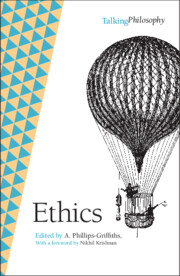Book contents
- Ethics
- Talking Philosophy
- Ethics
- Copyright page
- Contents
- Foreword
- Preface
- List of Contributors
- Objective Prescriptions
- Integrity and Self-Identity
- The Better Part
- Invincible Knowledge
- Emmanuel Levinas: Responsibility and Election
- Ethical Absolutism and Education
- Morals and Politics
- Duties and Virtues
- The Definition of Morality
- Ethics, Fantasy and Self-transformation
- How We Do Ethics Now
- Justice without Constitutive Luck
- Who Needs Ethical Knowledge?
- Institutional Ethics
- References
- Index
The Better Part
Published online by Cambridge University Press: 14 January 2023
- Ethics
- Talking Philosophy
- Ethics
- Copyright page
- Contents
- Foreword
- Preface
- List of Contributors
- Objective Prescriptions
- Integrity and Self-Identity
- The Better Part
- Invincible Knowledge
- Emmanuel Levinas: Responsibility and Election
- Ethical Absolutism and Education
- Morals and Politics
- Duties and Virtues
- The Definition of Morality
- Ethics, Fantasy and Self-transformation
- How We Do Ethics Now
- Justice without Constitutive Luck
- Who Needs Ethical Knowledge?
- Institutional Ethics
- References
- Index
Summary
According to Aristotle, the goal of anyone who is not simply stupid or slavish is to live a worthwhile life.1 There are, no doubt, people who have no goal at all beyond the moment’s pleasure or release from pain. There may be people incapable of reaching any reasoned decision about what to do, and acting on it.2 But anyone who asks how she should live implicitly agrees that her goal is to live well, to live a life that she can think worth living. That goal, eudaimonia, is something that is sought for its own sake, and for nothing else. Anyone who asks herself how she should live can answer that she should live well. The answer, admittedly, needs further comment. Aristotle went on to suggest that ‘living well’ amounted to living in accordance with virtue, or if there is more than one virtue, in accordance with the best and most complete. Eudaimonia, happiness, is virtuous activity over a whole life. To live a worthwhile life we must acquire and practice habits of doing the right thing, for the right reason. Equivalently, we must do what a virtuous person would, and in the way she would, for the sake of to kalon, or beauty.
- Type
- Chapter
- Information
- Ethics , pp. 42 - 76Publisher: Cambridge University PressPrint publication year: 2022



